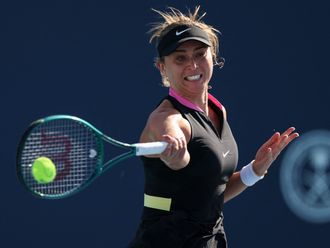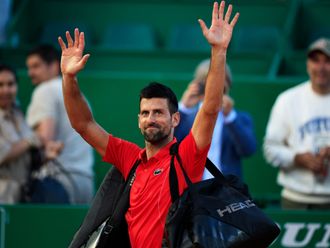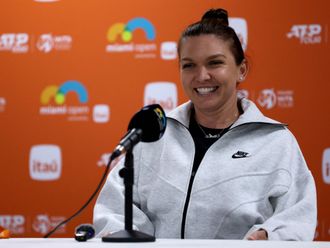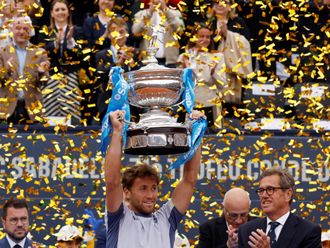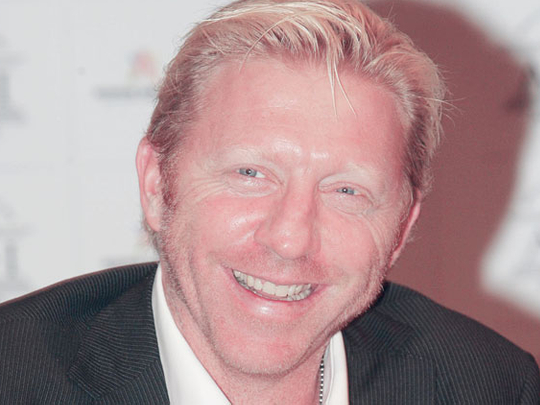
Dubai:
As a player Boris Becker changed something in tennis. As a 17-year-old he became the youngest player ever to win at Wimbledon in 1985. The German went on to add another two titles at Wimbledon along with another two at the Australian Open and one at the US Open.
He also won 13 Masters Series titles, five elite indoor titles and an Olympic gold medal [with Michael Stich] in 1992 at the Barcelona Games. Tennis magazine ranked Becker as the eleventh best male tennis player of the period between 1965 and 2005. In December 2013, Becker accepted the offer to be the head coach of world number one Novak Djokovic, and life has never been the same for the German and his young Serbian student has gone on to win almost everything that has come in his path.
GULF NEWS: In 2015, Djokovic won almost everything there was to win in world of tennis. He was at his very best as one of the shinning stars in men’s tennis. Do you ever think he can repeat such a year?
BORIS BECKER: The most important thing when one is winning the way Novak is, is to take a real, real break from the sport. Take total off from tennis and not compete in any tournament. Think about this: he has played 80 matches at the highest level in the last one year and this is gigantic, but very necessary to be where is currently is. Therefore the most important is to rest and relax and take a break from the tour. And, most importantly, he needs to keep himself happy and content based on what he has achieved.
Q. But such breaks in modern tennis have become very rare?
BB: But they are sometimes just as important as a victory in a tournament. Breaks, if used properly, are like a workout. Modern day tennis can be very demanding and therefore it is equally important a player of his calibre stays primed at the highest level, both mentally and physically as that keeps the thought of retirement out and success continues. Many players forget this aspect today and then pay for it in the long run.
Q. What does 2016 look like?
BB: 2015 was among the most successful for all of us, but that is now past us. In fact, that no longer interests us. All are again at the starting line and want to finish first. Novak is fresh and rested in the race, and as we saw in Doha, we have seen there is a fire burning again inside him for tennis.
Q. If you look back at your start as Djokovic’s coach some two years ago, what sort of expectations did you come in with and how many did you fulfil?
BB: Honestly, neither Novak nor I had dreamed of what we have achieved in the past two seasons. Since I have sometimes asked myself if such things really happen? We wanted to go back to square one and win Grand Slams and all the big ones. And then followed this dominance from Novak in the last 18 months, which has both been unusual and remarkable at the same time. There are not many players who have the ability to better what Novak has done in the last few months with his sheer quality and endurance. It has been a truly wonderful journey with him and I have been party to experience some of the most unexpected moments of happiness in the one sport I love.
Q. Does Djokovic have motivation problems?
BB: I doubt it. He is like all the big names in sport. If you are in the race, and if you win, then you want more, always more. He has a fabulous setting, almost relates everything to his tennis. He knows what he has with whom and how to do things to be successful. At the top level of tennis, it all boils down to being better in the finer details. And in this he is a master. He simply shows that huge appetite to succeed as one of the greatest players in men’s tennis.
Q. Are you now better as a coach with Djokovic? Or rather, what makes Becker as good as Djokovic?
BB: I’ve never liked talking about me and my success percentage in comparison to Djokovic. The fact remains that I had a good tennis career and now I am in a position to pass on my experience to Novak. Luckily, Novak is one of those players who listens because he wants to draw some insights from my experience. He always wants to learn every day and this is the trait of true champions.
Q. Do you agree that Becker the coach is almost more successful than Becker the player?
BB: For me probably both are an equal reality. As a player I have achieved, and now as a coach I am doing what I think is best for Novak. At the same time I do not know how this will all end. Being a coach is part of my life now and it will go on.
Q. Over the years as a player, what have you actually taken from the various coaches you have worked with?
BB: I had wonderful coaches and mentors in my career. I had people like Günther Bosch, Bob Brett, Nick Bollettieri and Mike Depalmer Jr. All were very different characters with their own abilities and I assimilated something special from each of them. I have profited immensely from their tutelage and everything that I am today I have learnt from these great coaches and it now flows into my work. Everything, such as season planning, tactics, opponent’s observations and the psychological game now makes much more sense than when I was a player.
Q. How did Djokovic prepare for the Wimbledon final against Federer in 2015?
BB: Well, it would be unfair to confine the success to just the last two days of the Grand Slam. Any success is always a process. And in this case, the success story began in bringing Novak back on track mentally after losing the French Open final. The rest of the team was of great help along with his wife [Jelena Ristic]. He was pretty down and out after that defeat in Paris [against Wawrinka] and it took a lot of tact from everyone around him to get him in the right frame of mine for Wimbledon. But then, that is the job of Team Djokovic and I need to spearhead that. Not only does it help the player, it is moments like these that bring out the best from me as a coach. When he stood there in the middle with the trophy hoisted above his head it was all the hard work coming together, and no one can see this work being done.
Q. As a former number one and as a Major winner, is it a case of more persuasion or more reasoning power that takes over?
BB: It’s just the way that you as a multiple Grand Slam winner have a different approach. Personally, I have experienced everything in men’s tennis at the highest levels. The ups and downs, the comebacks, the crazy match situations, the rain breaks at Wimbledon or anywhere else. So for Novak, it is important to be able to speak with someone who can bring a life experience to an authority from his own experience. That supports him and helps him to overcome a crisis in that particular situation.
Q. 2016 is a complex year, also because of the Rio Olympic Games. How important are the Olympic Games to Djokovic?
BB: Rio is extremely important to me and to Team Djokovic. This idea of competing in a prestigious sport like an Olympic Games with all the great stars and icons in one place is an incredible idea and has always fascinated me. I was injured four times despite being on the German team — in 1984, 1988 and 1996. But in the 1992 Barcelona Games on a slow clay court I won the doubles gold medal with Michael Stich. At that time, he was one of my biggest rivals as in 1991 he won Wimbledon against me and in 1992 I beat him in the quarter-finals. And then came the Barcelona Olympics and the victory. We somehow got it all together, and till today I do not even remember exactly how we did it. When I tell my children now that I have won gold medals, I rise in their esteem. Today gold in tennis is worth much more than it was then. Therefore, the answer to the question, what would it mean to Novak? It would mean very much as that’s a huge goal for him, and I will be there with him in Rio.
Q. There have been repeated complaints that Djokovic’s successes have not been adequately acknowledged in the eye of the tennis public. Do you feel something has changed since 2015?
BB: Definitely, yes. The biggest element here is how Novak dealt not only with the wins, but more importantly, with that single painful defeat in Paris [against Stan Wawrinka in the final of the French Open]. His state at that time with all these emotions and the tears is one of the most moving moments that I have ever experienced in tennis. I think people get to see simply what a great champion he is from the outside, but no one really knows what happens inside there. He has modesty in his success, but he is also gracious in defeat. He is not the arrogant type. That’s true leadership in sport and that serves tennis well.
Q. What is Novak Djokovic like?
BB: On the one hand, Novak is a warrior who is always ready for a confrontation and for conflict with any of his opponents. He is a street fighter who wants to assert himself with all his might. Think about the US Open final last year. It was Djokovic versus Federer and there were a few hundred Serbs in the crowd against more than 24,000 fans cheering for Federer. And yet my warrior won. Not many can achieve this. You need to have the backbone to come up with that performance and deliver on the biggest stage.
Q. Perhaps you are among the best people to explain this rivalry between two of the greatest players in men’s tennis. How can this rivalry help the sport in the future?
BB: There are two different characters who meet here. This is the attraction, the tension and the thrill. It is black versus white, but not necessarily good versus evil. I have often been taken to the cleaners, just because I allegedly said something about Roger. Here what they need to understand is that Novak is what matters to me … no one else. It’s a bit crazy that people do not understand that as a professional coach I’m on Team Djokovic. So technically, I have to take care of his success. It’s like [Pep] Guardiola (Bayern Munich coach) going out and saying he wants to go slow on Borussia Dortmund just because he is good friends with Thomas [Tuchel, the Borussia coach]. It does not really matter what successes you have had as a player or as a coach. But in the end you will be judged by your life’s work. And one of these is the wins — whether as a player or a coach.
Q. There seems to be this notion that there is some sort of tension between Team Federer and Team Djokovic?
BB: Let me be crystal clear. There are absolutely no problems with Roger or any of his team. Practically, every week we see each other in the locker room and we shake hands. My family and I have tremendous respect for what he has achieved in this lifetime. But as a professional I have a job to do and the focal point here is ‘How can I beat him?’ or ‘How can my player [Djokovic] win against him?’
Q. As a successful coach, are you happier now than two years before?
BB: No. I have always been happy. I’m lucky that I do not have to depend on professional successes. For me, the equation goes more the other way. I am privately and with my family at my best, and the same applies to me being with Team Djokovic. This was the case in 2013 and it is still the case in 2016. Nothing has changed really.
Q. Tennis and Becker. Are they inseparable?
BB: No, I doubt it. I have been in the business for more than 30 years now and I have not stepped away from this sport even for a second. Everything that has happened in my life has been tennis-related. Of course everyone loves the ‘issues’ or ‘scandals’ that surround me. Becker is one person who is thought only in extremes. He gets no grey areas. But what people need to realise is that I was never away from my sport. Maybe I stopped being a tennis player. But since then I have worked as an expert and commentator, in Germany and elsewhere, and I doubt anyone noticed that.
Q. Professionally, were there any other challenges before you?
BB: My life would have been poorer if I would have accepted any other challenge. I have tried many, many things professionally. But this one is the best yet. And I doubt there will be any other like this one. In life there can be just one thing: either it’s a triumph or a tragedy. At this stage of my life I have no regrets whatsoever. What I have achieved as a player stays, and now what I have achieved with Djokovic, also stays.
Q. How is Mission Djokovic going?
BB: To start with, this mission is far from over. I want to leave an imprint as a coach in the Djokovic camp so that he can continue to evolve as a top player. This job is tough. And as much as people don’t see it and realise it, it does take a tremendous amount of work from me. Nothing is certain in this business and no victory comes easy. Look at [Roger] Federer and [Rafael] Nadal. They are two absolutely outstanding players and yet, they have not won anything big for some time now, no slams at least. This shows what it means today to be Grand Slam winner. There is always a small miracle. Tennis is a business of winning. We in the Djokovic team think differently and that is why we are a chip above and that is why we make every tournament a success.
Q. Why did you choose to coach Djokovic?
BB: In fact I’ve been asked before by some players. But I have refused because I know the intense travel connected with the sport. I know myself after travelling on the tour for 20 years. But when it came to the world number one I could not say no. Why? Because I know the difference between being with a tennis player and being with a tennis player who gives everything to tennis. He has the motivation, the passion and the intelligence. It’s simply too perfect to refuse. With Djokovic every minute is worthwhile work. I do not know if there could be a similar partnership again with any other player. I’m not getting any younger and then there are the demands to spend more time with the family. As it is, I already see so little of my wife and children.
Q. The big question before Germany at the moment is the problem of the refugees. How can sport help in this case?
BB: I have not understood much of the German debate on the issue. But let us be realistic and take a look at how many people with German passports have parents and grandparents who were refugees themselves. Quite a few I must say. And that includes me as well. In so many years the waves of immigration have hardly ever harmed our country. And we are obliged to help, but not without clear conditions laid down. We are a rich country, which has its possibilities, and sport will surely help us as it can provide a very decisive impulse to want to do something for humanity.


